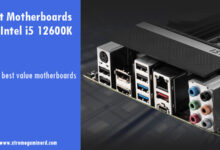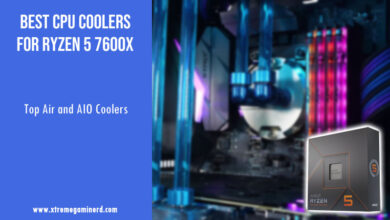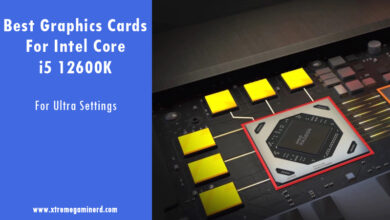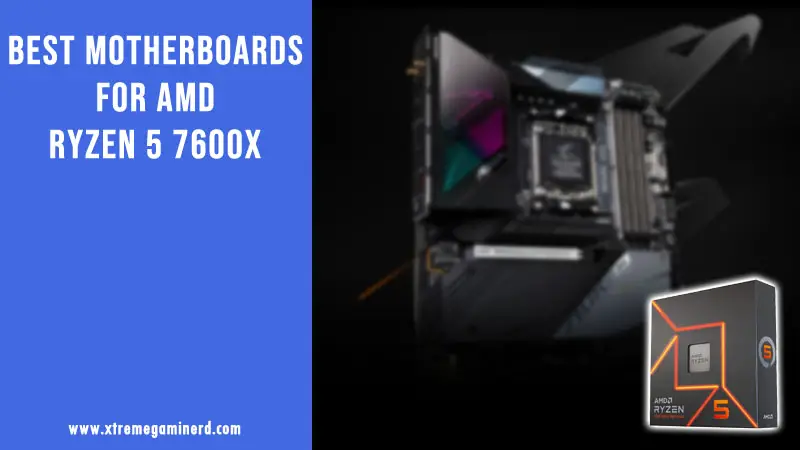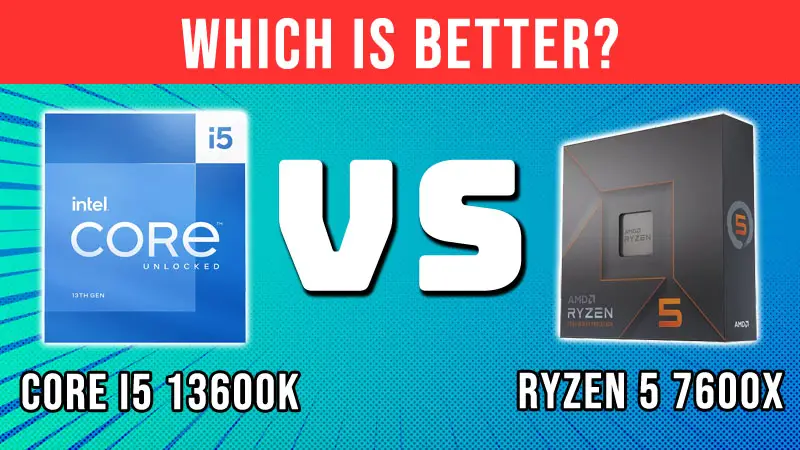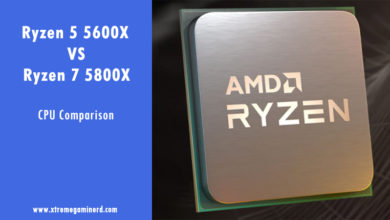With the launch of AMD Ryzen 5 7600X, many are looking forward to skipping the Ryzen 5600X as the 7600X is around 20% faster in gaming.
For around the same price tag, some users are in a dilemma to choose between the Ryzen 7600X and the Core i5 12600K. While the 7600X is newer and faster, the Core i5 has a lot of advantages over the former.
Choosing between the two right now is not as easy as looking at the performance numbers as there are a lot of factors that are playing an active role that will decide how much value you will get for your money.
Specifications Difference
SPECS | INTEL CORE i5 12600K | AMD RYZEN 5 7600X |
Code Name | Alder Lake | Raphael |
Lithography | Intel 7(10nm) | 5nm |
Socket | LGA 1700 | AM5 |
Cores/Threads | 10/16 | 6/12 |
Clock Speeds | 3.6/4.9GHz | 4.7/5.3GHz |
L2/L3 Cache | 9.5/20MB | 6/32MB |
TDP | 125W-150W | 105W |
Integrated Graphics | Yes | Yes |
Architectural Difference
The architectures of both CPUs can’t be compared directly. The 7600X uses Zen 4 which has its own design much different from the i5 12600K.
Zen 4 uses an improved block design where the L2 cache is now doubled over the Zen 3. However, the block design isn’t created from scratch and is similar to Zen 3 in a lot of areas.
Zen 4 allows all 8 cores per CCD where each CCD has two CCXs with 4 cores each. This gives access to the full L3 cache in a different way than the Zen 3. However, the power limit is increased from 65W to 105W. Talking about the core clocks, we can see that AMD made a huge jump over Zen 3 CPUs, and the 7600X features 1GHz higher base/boost clock speeds.
Normally, the 7600X easily runs at around 5.5GHz on all cores which is impressive and provides at least a 50% boost in performance alone. Meanwhile, the i5 12600K has a max turbo boost clock of 4.9GHz.
As for its architecture, the Intel Core i5 12600K is completely different from not only Zen 4 but also from the previous Intel 11th gen CPUs. It is the first-ever series to feature a hybrid architecture where the i5 12600K uses Performance and Efficient cores.
The 6 performance cores are mostly active in an intensive process but the processor gets a boost from the 4 efficient cores in multi-core applications.
In a nutshell, this is what you need to know about their fundamental architectural difference. Diving too deep into their respective block design won’t help you to choose between these two processors.
- Game and multitask without compromise powered by...
- Integrated Intel UHD 770 Graphics
- Compatible with Intel 600 series and 700 series...
- Intel Core i5 Deca-core (10 Core) 3.70 GHz...
Motherboard Compatibility
Both the Ryzen 7600X and Core i5 12600K are overclockable. So, obviously, AMD and Intel have designed unlocked chipsets for these processors.
While the chips can be used on both locked and unlocked chipsets, they will always use the same socket. Ryzen 7600X is compatible with AM5 and the 12600K will fit on an LGA 1700 socket.
AMD currently has 4 total chipsets for the Ryzen 7000 family which are essentially dual X670 and B650 chipsets with Extreme and Non-Extreme versions respectively for both. The Extreme editions will provide more PCI-E 5.0 lanes compared to the non-E editions.
i5 12600K, on the other hand, can be used on 6 different 600 series chipsets, and the only chipset that allows CPU overclocking is the Z690.
The i5 12600K and all other 12th-gen CPUs are also compatible with the next-gen Intel motherboards released for Intel 13th-gen Raptor Lake CPUs as these boards will utilize the same LGA 1700 motherboard.
RAM Compatibility
Ryzen 7600X is only compatible with DDR5 RAM and therefore, its compatible AM5 motherboards will only have support for DDR5.
On the other hand, the i5 12600K is compatible with both DDR4 and DDR5 out of the box giving users more choice than the 7600X users.
Currently, Intel has 600 series chipset motherboards with both DDR4 and DDR5 versions, however, the DDR5 boards will be the norm with 700 series motherboards but DDR4 boards are still going to exist.
Thermals
Here comes one of the most important parts. As tested by many reviewers, it is now confirmed that Ryzen 7600X runs hotter than not only the 12600K but also hotter than any other previous-gen Ryzen CPUs.
Normally, the Ryzen and Intel Core series from the past few years run at a temperature zone of 60-80C which is also the optimal temperature while gaming, the 7600X easily reaches 90C even with a decent 360mm cooler((https://youtu.be/JM-twyjfYIw?t=1088)).
This makes the 12600K better in terms of thermals and your system will run cooler overall((https://youtu.be/OkHMh8sUSuM?t=346)). With the 7600X, your system will need better ventilation, a better CPU cooler, and of course, more case fans. The surprising part is that even if the 7600X reaches above 90C, AMD doesn’t declare it as overheating and instead calls it “Normal”.
While in gaming, the 7600X temps won’t necessarily go that high but stressing it with CPU-intensive applications will definitely result in high temperatures.
Gaming And Non-Gaming Performance
The gaming and non-gaming performance between 7600X and 12600K varies and depends on the games and applications used. Gaming performance is what particularly catches our attention and this will be the sole reason for many to choose between the two.
As tested by GamersNexus, we see a 2-15% lead by 7600X in gaming whereas the non-gaming performance of both the CPUs is basically a tie where they both beat each other or tie in different applications((https://youtu.be/JM-twyjfYIw)).
The good thing about the 7600X is that it beats the 12600K basically with 4 fewer cores and 4 fewer threads. Although one may argue that the 12600K uses efficient cores as well, the 7600X is still impressive as it is doing a much better job than the 5600X while bringing the same core/thread count.
So, the 7600X is definitely a better option overall when we keep the other factors out but as a consumer, we are going to take everything into account to see what provides more value for the money below.
- The Socket AM5 socket allows processor to be...
- Ryzen 5 product line processor for your...
- 5 nm process technology for reliable performance...
- Hexa-core (6 Core) processor core helps processor...
Value Comparison
The 7600X is priced at $300 whereas the 12600K costs around $270-$280. So, going with the pricing alone won’t declare any of these CPUs a clear winner. When we look at the whole picture, things get clearer but also more complicated.
The first and foremost important thing is the total platform cost. The price of Z690 motherboards is significantly lower than the X670 motherboards. The B650 boards for Zen 4 will also be costlier than the B550 and will compete with the Z690 motherboards.
Considering that you are going to use a budget or a mid-range B650 or X670 motherboard with Ryzen 7600X, your total cost will be higher than using a budget or a mid-range Z690 motherboard with the 12600K. Also, you don’t get DDR4 RAM support on the B650 or X670. DDR5 memories are still costlier than the DDR4 RAM kits and that adds an additional cost to the 7600X.
The next major problem with the 7600X is the cooling solution. As it runs super hot, you need a 280mm or a 360mm AIO cooler if you want to avoid looking at the real-time temp. A 280mm/360mm AIO cooler is definitely expensive and with the i5 12600K, you can save some good bucks by going with a dual tower air or a 240mm AIO cooler.
On the opposite side, the 7600X will be a better choice as the AM5 platform is going to last longer than the LGA 1700. Intel has already planned to change its socket after launching the Raptor Lake CPUs for the LGA 1700. So, while upgrading to a 13th gen CPU from 12600K will be easier, you won’t be able to upgrade to the next-gen CPUs if you go with an LGA 1700 motherboard.
Also, I can hardly imagine anyone upgrading his CPU from 12th gen to 13th gen CPU when there is no significant performance gap between these generations that justifies the extra expense.
Conclusion And Final Words
If I were to choose between the two, I would personally go with the i5 12600K as most users will be using this for at least 3-4 years before the next upgrade. After 4-5 years, AMD is more likely to launch another platform making AM5 completely useless.
Going with i5 12600K will save a good amount of money from the cost of the motherboard, RAM, and cooling solution which can be invested into a better GPU.
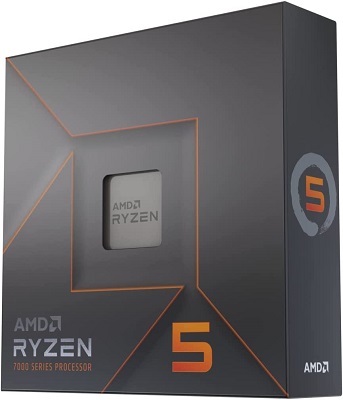
Reasons To Buy Ryzen 5 7600X
[wp-svg-icons icon=”thumbs-up” wrap=”i” color=green] AM5 will last longer
[wp-svg-icons icon=”thumbs-up” wrap=”i” color=green] RDNA 2 based iGPU
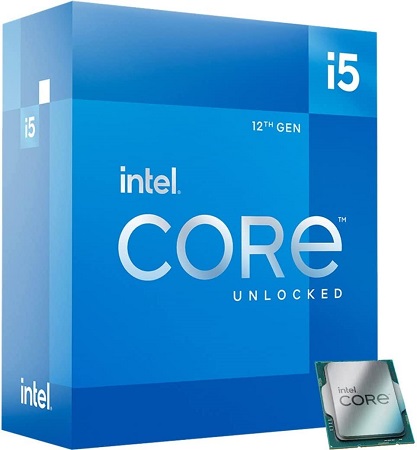
Reasons To Buy Core i5 12600K
[wp-svg-icons icon=”thumbs-up” wrap=”i” color=green] Runs cooler than 7600X
[wp-svg-icons icon=”thumbs-up” wrap=”i” color=green] Supports both DDR4 and DDR5
Related:
- AMD Ryzen 5 7600X vs Ryzen 7 5800X3D
- AMD Ryzen 5 7600X vs Ryzen 5 5600X
- AMD Ryzen 5 7600X vs Ryzen 7 7700X
- AMD Ryzen 7 7700X vs Intel Core i7 12700K
- AMD Ryzen 7 7700X vs Ryzen 7 5700X
- AMD Ryzen 7 7700X vs Ryzen 7 5800X3D
- AMD Ryzen 9 7900X vs Ryzen 9 7950X
- AMD Ryzen 9 7900X vs Intel Core i9 12900K
- AMD Ryzen 5 7600X vs Intel Core i9 12900K
- AMD Ryzen 9 7900X vs Ryzen 9 5900X
- AMD Ryzen 9 7950X vs Ryzen 9 5950X

